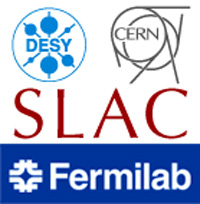

Monday - June 2, 2008
SLAC Today is
available online at:
http://today.slac.stanford.edu
In this issue:
High-Energy Physics Labs Join to Build a New Scientific Information System
Colloquium Today: Charles Baltay to Discuss P5 Report and Future of Particle Physics
Read More About It: Expanded U.S. LHC Blogs
 |
 |
|
Monday - June 2, 2008 |
 High-Energy Physics Labs Join to Build New Scientific Information SystemThe European Organization for Nuclear Research (CERN), the Deutsches Elektronen-Synchrotron (DESY), the Fermi National Accelerator Laboratory (FNAL) and SLAC announced last week they will join to build INSPIRE, the next-generation high energy physics information system, which will empower scientists with innovative tools for successful research at the dawn of an era of new discoveries. The announcement was made at the second annual Summit of Information Specialists in Particle Physics and Astrophysics held at DESY on May 20th and 21st. The summit was attended by representatives from the four laboratories, other information providers, including Cornell's arXiv.org and the SAO/NASA Astrophysics Data System (ADS), and leading publishers. Addressing the meeting, DESY Research Director and CERN Director-General Elect Rolf-Dieter Heuer endorsed this endeavor by saying, "INSPIRE bears the promise of answering emerging information needs and delivering higher efficiency in science through advanced information discovery. It constitutes an exciting opportunity for experimentation and innovation in partnership with other disciplines and publishers." Read more... |
||
|
|
||

Charles Baltay to Discuss P5 Report and Future of Particle Physics
The panel, chaired by Professor Charles Baltay of Yale University, has completed its "critical examination of the investments that would be needed to ensure the vitality, scientific productivity, and discovery of the field during the next decade." This report, which provides recommendations that take into account the field's fluid nature and considers projects in different budget scenarios, was presented to HEPAP in April. In this afternoon's colloquium, Baltay will describe and explain the P5 results. The colloquium takes place at 4:15 p.m. in Panofsky Auditorium. All are invited to attend. |
Read More About It: Expanded U.S. LHC Blogs
Want to read more about the Large Hadron Collider (LHC) than endless discussions of doomsday scenarios? Check out the newly expanded U.S. LHC blogs, which recently added six new authors to the roster. With startup of the LHC scheduled for this summer, the 10 U.S. LHC bloggers bring you news from the LHC's front lines, as they work with thousands of colleagues to get the world's most complex accelerator and experiments up and running. Like the four veteran US LHC bloggers, the new recruits represent scientists from U.S. institutions working at CERN and in the United States, for universities and national laboratories, at all levels from graduate students to university professors. The bloggers include four scientists each from the two largest LHC experiments ATLAS and CMS; a nuclear physicist from the ALICE collaboration; and an accelerator physicist working on LHC commissioning and upgrades. |
Events
Access (see all)
Announcements
|
| | ||
|
|
||
 <%
Response.AddHeader "Last-modified", getArticleDate()
'Response.AddHeader "Last-modified","Mon, 01 Sep 1997 01:03:33 GMT"
'Monday, December 06, 2010
%>
<%
Response.AddHeader "Last-modified", getArticleDate()
'Response.AddHeader "Last-modified","Mon, 01 Sep 1997 01:03:33 GMT"
'Monday, December 06, 2010
%>View online at http://today.slac.stanford.edu/. |
||